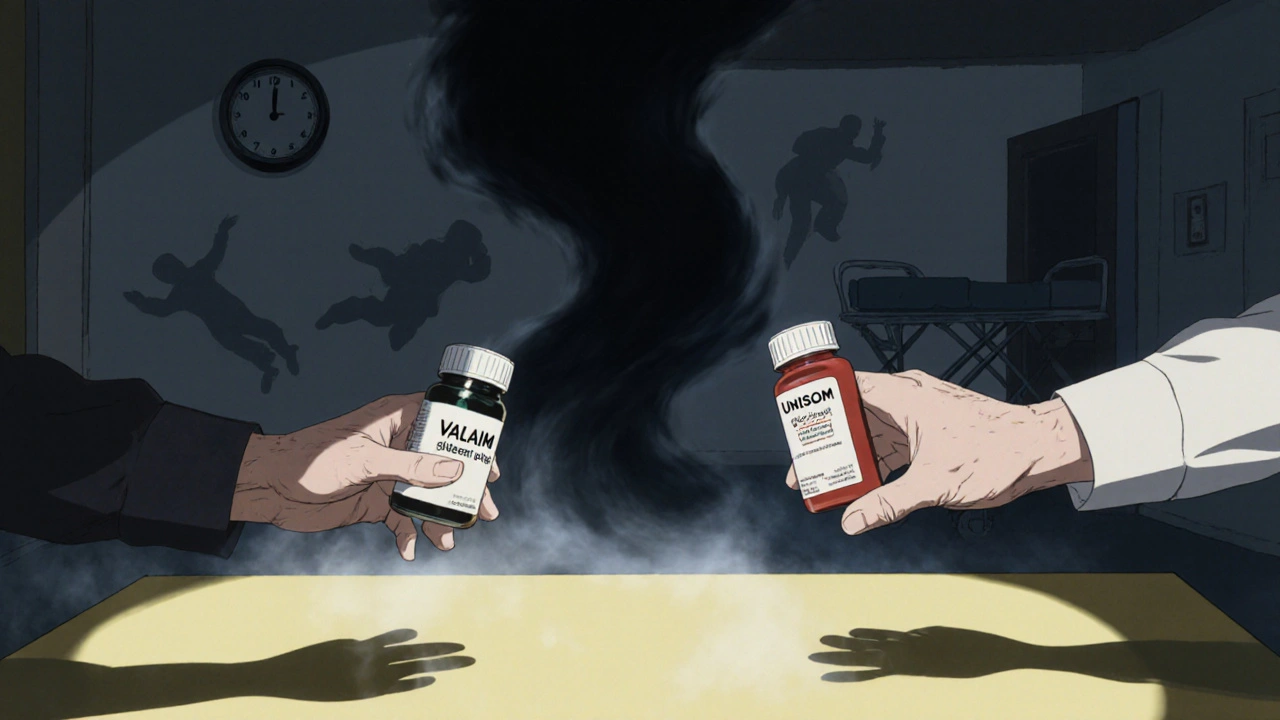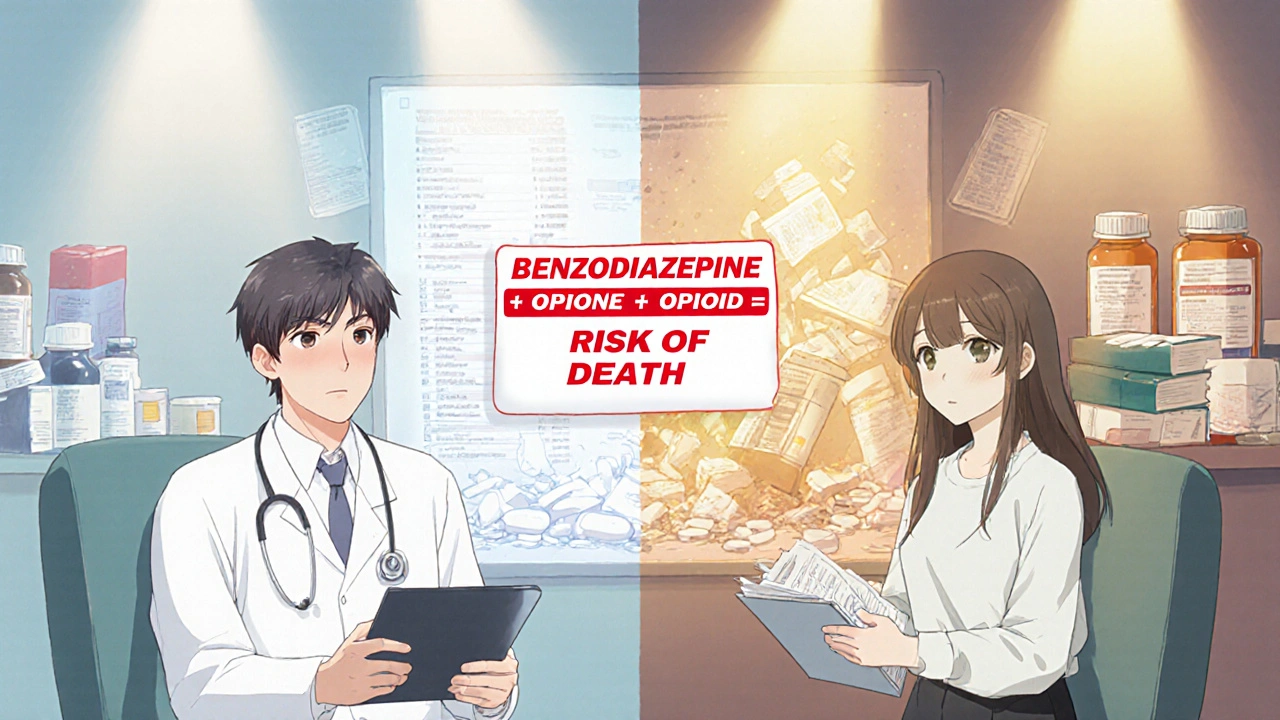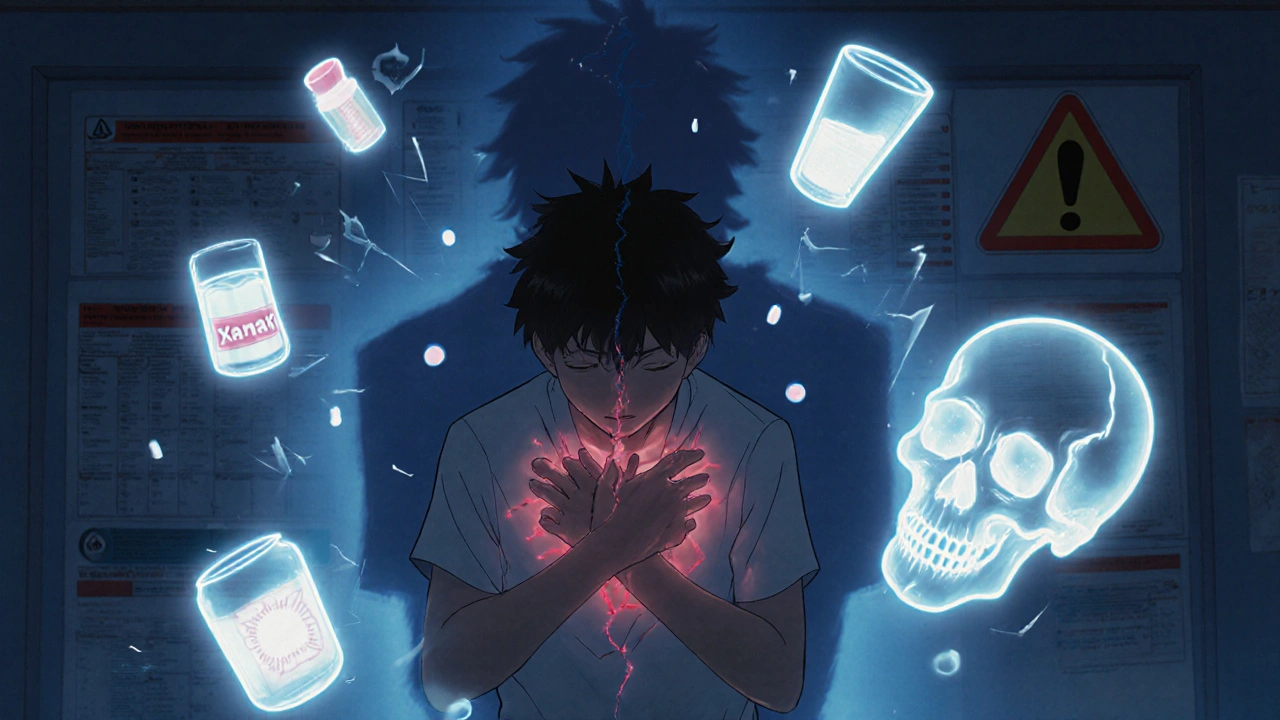Benzodiazepine Interaction Checker
Check Your Medication Combination
How It Works
This tool checks for dangerous combinations based on FDA warnings and medical guidelines from the article.
Warning: This tool provides general information only. Always consult your doctor or pharmacist for personalized medical advice.
Key facts:
- 75% of benzodiazepine overdose deaths involve opioids
- Combining benzos with alcohol increases overdose risk by 15x
- 23% of opioid-related deaths involve benzodiazepines
Interaction Result
When anxiety hits hard, a doctor might reach for a benzodiazepine-something like Xanax, Ativan, or Valium-to bring relief fast. These drugs work within an hour, calming the nervous system by boosting GABA, the brain’s natural chill-out chemical. For many, they’re a lifeline during panic attacks, surgery recovery, or acute stress. But here’s the part no one tells you until it’s too late: benzodiazepines aren’t safe to mix with just anything. And when combined with other common meds or substances, they can turn deadly.
How Benzodiazepines Work-and Why They’re Dangerous with Other Drugs
Benzodiazepines slow down your central nervous system. That’s why they help with anxiety, seizures, and muscle spasms. But that same effect becomes a liability when you add another CNS depressant-like opioids, alcohol, sleep pills, or even some cold medicines. Together, they can suppress breathing so deeply that your body stops taking in oxygen. This isn’t theoretical. Between 2011 and 2016, 75% of benzodiazepine-related overdose deaths involved opioids, according to FDA data. That’s not coincidence. It’s chemistry.
Take someone on oxycodone for chronic pain. Add Xanax for panic attacks. The body doesn’t know how to handle the double hit. Both drugs target the same brain pathways. The result? Slurred speech, dizziness, extreme drowsiness-and in worst cases, coma or death. One Reddit user described being hospitalized after stopping breathing during sleep, just two weeks after starting both prescriptions. That story isn’t rare. A 2022 survey by the Anxiety and Depression Association of America found that 32% of benzodiazepine users were also prescribed opioids. Nearly one in five of those people had serious breathing problems.
The FDA’s Warning You Probably Didn’t Read
In September 2020, the FDA did something unusual: they forced every benzodiazepine manufacturer to add a Boxed Warning-the strongest type of safety alert-to their labels. It says plainly: combining these drugs with opioids, alcohol, or other sedatives can cause respiratory depression, coma, or death. That warning didn’t come out of nowhere. Between 2011 and 2019, benzodiazepine-opioid combinations were involved in 23% of all opioid-related deaths. And it’s not just opioids. Mixing benzos with alcohol increases overdose risk by 15 times compared to opioids alone. That’s not a typo. Fifteen times.
Even over-the-counter sleep aids like diphenhydramine (Benadryl) or doxylamine (Unisom) can be dangerous. Many people don’t realize these are sedating. They think, “I’m just taking something for sleep,” not knowing it’s adding fuel to the fire. One Drugs.com review from a pharmacy student described seeing multiple near-fatal cases in the ER-all from patients who didn’t know their nighttime allergy pill was interacting with their Ativan.
Who’s Most at Risk?
Older adults are especially vulnerable. The American Geriatrics Society says benzodiazepines should be avoided in people over 65. Why? They metabolize drugs slower, so the effects last longer. Even a normal dose can cause dizziness, confusion, and falls. Add another sedating drug-like a muscle relaxer or heart medication-and the risk of a hip fracture triples. A 2019 study in the Journal of the American Geriatrics Society found that seniors on benzodiazepines had a 50% higher chance of falling. When combined with other CNS depressants? That jumps to 200%.
Younger people aren’t safe either. In 2020, nearly 5 million Americans aged 12 and up misused benzodiazepines, according to SAMHSA. Many were using them recreationally or mixing them with alcohol or street drugs. A 2023 Healthgrades analysis of patient reviews showed 27% of negative experiences involved dangerous drug interactions. Common complaints: “I passed out after drinking wine with my Xanax,” or “My husband couldn’t wake up after taking his sleep med and Valium.”

Benzodiazepines vs. Alternatives: What’s Safer?
Not all anxiety meds carry the same risks. SSRIs like sertraline (Zoloft) or escitalopram (Lexapro) take 4 to 6 weeks to work-but they don’t cause dependence. They don’t slow your breathing. They don’t interact dangerously with opioids. That’s why, by 2022, 68% of new anxiety prescriptions were SSRIs, compared to just 22% for benzodiazepines.
Other options exist too. Buspirone (Buspar) is an anti-anxiety drug with almost no drug interactions. It’s not fast-acting, but it’s safe for long-term use. Cognitive behavioral therapy (CBT) is another proven method-no pills, no risks. In fact, the American Psychiatric Association now recommends CBT or SSRIs as first-line treatment for anxiety. Benzodiazepines? Only if everything else fails-and even then, for no longer than 4 weeks.
What to Do If You’re Already on a Benzodiazepine
If you’re taking a benzodiazepine, here’s what you need to do right now:
- Check every medication you’re on-including supplements and OTC drugs. Write them down.
- Look for anything that causes drowsiness: opioids, sleeping pills, muscle relaxers, antihistamines, even some antidepressants.
- Ask your doctor or pharmacist: “Could any of these interact with my benzo?” Don’t assume they know.
- If you’re on opioids and benzos together, ask if you can taper off one. Many doctors still prescribe both out of habit, not necessity.
- Absolutely avoid alcohol. No exceptions. Not one drink. Not even a glass of wine.
If you’ve been on a benzodiazepine for more than a few weeks, don’t stop suddenly. Withdrawal can cause seizures, hallucinations, or rebound anxiety worse than before. Tapering slowly under medical supervision is critical. Short-acting drugs like alprazolam (Xanax) need slower reductions-around 5-10% every 1-2 weeks. Long-acting ones like diazepam (Valium) can be reduced faster, but still require a plan.

Why Doctors Still Prescribe Them
It’s not that doctors don’t know the risks. They do. But anxiety is hard to treat, and patients often want quick relief. Benzodiazepines work fast. They’re convenient. In emergency rooms, they’re used for acute panic attacks. In hospice care, they ease terminal anxiety. Dr. Christine Musso from Hartford Hospital says they can be “life-saving” when used correctly-for short periods, in the right patients, with full awareness of the dangers.
The problem isn’t the drug. It’s the system. A 2022 report from the American Medical Association found that only 43% of primary care doctors routinely screen for benzodiazepine-opioid combinations-even though the FDA has warned about this for years. Many patients get prescriptions from different doctors without anyone seeing the full picture.
The Bigger Picture: Why Prescriptions Are Falling
The benzodiazepine market was worth $2.1 billion in 2022. But it’s expected to shrink by 3.2% each year through 2027. Why? Because people are waking up. Prescription rates dropped from 13.1% of U.S. adults in 2013 to 10.8% in 2021. Younger people are turning to therapy, mindfulness, and non-addictive meds. States with prescription drug monitoring programs (PDMPs) that flag benzo-opioid combos saw a 27% drop in dangerous pairings within 18 months.
Medicare and Medicaid now require special approval before allowing both opioids and benzodiazepines to be filled together. That’s a big shift. It means doctors have to justify why they’re prescribing something that could kill you.
These drugs aren’t going away. But their role is changing. They’re no longer a go-to solution for chronic anxiety. They’re becoming a last-resort tool-used carefully, briefly, and only when the risks are fully understood.
Can I drink alcohol while taking benzodiazepines?
No. Mixing alcohol with benzodiazepines dramatically increases the risk of respiratory depression, unconsciousness, and death. Even one drink can be dangerous. The FDA and CDC both warn against combining them. There is no safe level of alcohol use with these medications.
Are there safer alternatives to benzodiazepines for anxiety?
Yes. SSRIs like sertraline (Zoloft) and escitalopram (Lexapro) are first-line treatments for anxiety and have no risk of dependence or fatal interactions. Buspirone is another non-addictive option. Therapy, especially cognitive behavioral therapy (CBT), is also highly effective and recommended as a first step by major medical associations.
How long is it safe to take benzodiazepines?
For most people, benzodiazepines should not be taken longer than 2 to 4 weeks. Longer use increases the risk of dependence, tolerance, and severe withdrawal symptoms. The American Psychiatric Association’s 2023 guidelines recommend limiting use to this window unless absolutely necessary and under close supervision.
What should I do if I’m on both opioids and benzodiazepines?
Talk to your doctor immediately. The combination significantly increases your risk of overdose. Ask if you can taper off one medication, preferably the benzodiazepine, under medical supervision. Never stop either drug suddenly. Your doctor may refer you to a pain specialist or addiction medicine provider for a safer plan.
Can I take benzos with sleep aids like Ambien or melatonin?
Avoid combining benzodiazepines with sleep medications like zolpidem (Ambien) or zaleplon (Sonata)-they’re CNS depressants and can cause dangerous sedation. Melatonin is generally safer, but even natural supplements can enhance drowsiness. Always check with your pharmacist before mixing any sleep aid with a benzodiazepine.
Final Thought: Fast Relief Isn’t Worth the Risk
Benzodiazepines aren’t evil drugs. They’ve helped people through crises. But they’re not meant for daily, long-term use. And they’re not safe to mix with almost anything else. If you’re on one, know exactly what you’re taking, what you’re not allowed to combine it with, and why. Ask questions. Demand clarity. Your life might depend on it.


Robert Merril
November 16, 2025 AT 04:47So benzos are bad but SSRIs are fine huh? Funny how the FDA lets pharma push antidepressants for life while screaming about benzos. Guess the money trail matters more than the science
Georgia Green
November 16, 2025 AT 16:51I took Xanax for 3 months after my mom died. My dr said it was fine. Turns out I was mixing it with NyQuil for sleep. Ended up in the ER. Never again. Always check interactions.
Margo Utomo
November 16, 2025 AT 18:29Thank you for posting this. 🙏 I was on both oxycodone and Ativan for years. My doctor never warned me. I almost didn't wake up one night. Please talk to your dr. Your life matters.
Julie Roe
November 18, 2025 AT 08:22I get why people use benzos. Anxiety is hell. But I also get why they're not the answer. I switched to CBT after a bad interaction with alcohol. Took months but I'm finally sleeping without pills. No drama. No crashes. Just peace. You can do it too.
Kathy Grant
November 20, 2025 AT 03:09It's not about the drugs. It's about the silence. Doctors don't warn people because they're overworked. Pharmacies don't flag it because they're paid by volume. Patients don't ask because they're scared or ashamed. We're all part of the system that lets this happen. The real danger isn't the pill-it's the lack of care.
I used to think benzos were a quick fix. Now I see them as a bandage on a broken spine. You might feel better for a while, but the structure keeps collapsing. And no one tells you until you're on the floor.
I'm not saying never use them. I'm saying: know what you're doing. Write down every pill. Ask the pharmacist. Bring a friend to the appointment. Demand a second opinion. Your brain is worth more than convenience.
My sister died from mixing Valium with a muscle relaxer. She didn't know it was dangerous. The label didn't scream loud enough. The system didn't protect her. Don't let that be you.
There's no shame in needing help. But there's a lot of danger in assuming you're safe. The body doesn't care about your intentions. It only reacts to chemistry. And chemistry doesn't forgive mistakes.
I used to judge people on benzos. Now I just ask: are you safe? Are you aware? Are you being heard? That's all that matters now.
Ashley Unknown
November 20, 2025 AT 22:34Let’s be real-this whole thing is a Big Pharma scam. The FDA only added the warning after lawsuits started piling up. They knew for decades. They let millions get hooked just so they could sell SSRIs and therapy apps. They don’t care if you live or die-they care if you keep buying. And don’t even get me started on how CBT is just a $$$ racket with people in sweats talking about your childhood. Wake up. The system is rigged.
I saw a guy in the ER last year. He took one Xanax and one melatonin. Died in his sleep. His wife said he didn’t know melatonin could be dangerous. But the bottle didn’t say that. Why? Because the FDA doesn’t regulate supplements. That’s not an accident. That’s a loophole they built on purpose.
And what about the doctors? They’re paid by the hour. They don’t have time to read your 17 meds. They just check one box and move on. You think they care? They’re running on coffee and guilt. Meanwhile, you’re the one holding the pill bottle wondering why you can’t breathe.
They want you to think it’s your fault. But it’s not. It’s the system. The pills are just the delivery system for corporate greed. You’re not stupid. You’re just prey.
And now they’re pushing telehealth apps where some algorithm tells you to take Lexapro. No human ever looked at your face. No one asked if you were scared. Just a pop-up and a prescription. Welcome to the future.
They’ll take your benzos. Then they’ll sell you a $300/month app to ‘heal’ you. Meanwhile, your real problem-trauma, loneliness, poverty-is still there. And now you’re medicated, broke, and alone. Brilliant plan.
They don’t want you cured. They want you dependent. On pills. On apps. On therapists. On systems that profit from your pain. Don’t be fooled.
There’s no safe way to be broken in this system. Only different kinds of prison.
Jennifer Howard
November 21, 2025 AT 02:46This article is dangerously misleading. SSRIs are not safer-they cause emotional blunting, sexual dysfunction, and suicidal ideation in young adults. The FDA has black box warnings on them too. And CBT? It's a joke for severe anxiety. Most people can't afford it. And don't get me started on how many patients are abandoned after their benzos are taken away. You're not helping. You're just replacing one problem with another and calling it progress.
Sylvia Clarke
November 21, 2025 AT 13:22There's a quiet revolution happening in mental health, and it's not about pills. It's about community. I used to rely on Xanax to get through work meetings. Then I joined a peer support group. No therapist. No script. Just people who understood. We met every Tuesday. We didn't fix each other. We just showed up. And somehow, that was enough. The real medicine wasn't in the bottle-it was in the room.
And yes, I still take buspirone. But only because I asked for it. Not because someone handed it to me like a candy.
John Wayne
November 23, 2025 AT 05:16Interesting how the article ignores that benzos are often prescribed after SSRIs fail. The real issue isn't benzos-it's that doctors don't give SSRIs enough time. Six weeks is too long for someone in panic mode. So they reach for the fast fix. Then they get blamed for being dependent. The system sets you up to fail.
jalyssa chea
November 25, 2025 AT 03:36you shouldnt be on any of this stuff at all. just pray and get a life. people like you are why america is falling apart
Dave Feland
November 25, 2025 AT 19:59Let’s not forget: the 2020 FDA Boxed Warning was only added after 12,000+ deaths were documented in the FAERS database. But the real scandal? The same manufacturers who lobbied against the warning also funded the ‘anxiety is a chemical imbalance’ narrative. Cognitive dissonance isn’t a mental illness-it’s a business model.
Abdul Mubeen
November 26, 2025 AT 08:42Why is this even a debate? The data is clear. Benzodiazepines are hazardous. The problem is not the drug-it is the lack of oversight in primary care. In the UK, such prescriptions are restricted to specialists. In the US, any GP with a DEA number can prescribe them. That is not healthcare. That is negligence.
Joyce Genon
November 27, 2025 AT 16:33Everyone’s acting like this is new news. I’ve been seeing this for 15 years. ERs are full of people mixing benzos with sleep meds and calling it ‘just one drink.’ The problem isn’t the warning-it’s that no one listens until it’s too late. And now we’re supposed to feel bad for the people who ignored every red flag? Nah. This isn’t a tragedy. It’s a predictable outcome of ignorance and laziness.
Also, SSRIs aren’t magic. They’re just less likely to kill you immediately. That’s not a win-it’s a lower death rate. Big difference.
Noel Molina Mattinez
November 28, 2025 AT 19:44My mom died from this. She was on Valium and took a cold pill for her cough. No one told her it was dangerous. She was 72. She didn't even know what CNS depressant meant. The doctor didn't say a word. The pharmacist didn't say a word. The bottle didn't say a word. She just fell asleep and never woke up. I'm not mad. I'm just tired. This keeps happening. Why?
Roberta Colombin
November 30, 2025 AT 18:00To everyone reading this: you are not alone. If you are taking these medications, please reach out to someone you trust. If you are unsure about what you are taking, ask your pharmacist. They are trained to help. If you feel overwhelmed, call a crisis line. You deserve care. You deserve safety. You deserve to be heard. Please do not suffer in silence.